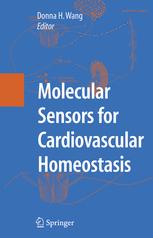

Most ebook files are in PDF format, so you can easily read them using various software such as Foxit Reader or directly on the Google Chrome browser.
Some ebook files are released by publishers in other formats such as .awz, .mobi, .epub, .fb2, etc. You may need to install specific software to read these formats on mobile/PC, such as Calibre.
Please read the tutorial at this link: https://ebookbell.com/faq
We offer FREE conversion to the popular formats you request; however, this may take some time. Therefore, right after payment, please email us, and we will try to provide the service as quickly as possible.
For some exceptional file formats or broken links (if any), please refrain from opening any disputes. Instead, email us first, and we will try to assist within a maximum of 6 hours.
EbookBell Team

4.8
84 reviewsMolecular Sensors for Cardiovascular Homeostasis
Donna H. Wang, MD, FAHA, FAAN
Biological homeostasis is maintained via intact function of an array of molecules detecting changes of microenvironments inside and outside of the biological system. These molecules including cell membrane proteins and ion channels are intimately involved in a variety of sensory pathways and respond to environmental stimuli, including altered temperature, pH, mechanical and osmotic stress, intra- and extracellular messengers, as well as changes in energy consumption. All of these modalities are involved in systemic, cellular, and molecular regulation. A better understanding of the structural, functional, and physiological properties of these proteins/ion channels would provide insight into mechanisms underlying disease processes, as well as facilitate fabrication of precisely defined, nanostructured interfacial architectures or molecular electronics that express and measure the activities of these proteins/channels.
Molecular Sensors for Cardiovascular Homeostasis reveals state-of-the-science of several newly discovered ion channel families and their role in the pathogenesis of cardiovascular diseases. This work offers comprehensive and up-to-date information for a deeper understanding of the relationship between macro- and micro-environments, ion channels, and pathophysiological responses, and for developing novel therapies for treating devastating cardiovascular illnesses.
Molecular Sensors for Cardiovascular Homeostasis is essential reading for neuroscientists, molecular biologists, cardiovascular researchers, electrophysiologists, cardiologists, pathologists, neurosurgeons, and researchers and students interested in biomedical engineering, nanotechnology, and design and development of medical devices.
Key Topics:
About the Editor:
Dr. Donna H. Wang is a Professor in the Department of Medicine, Neuroscience Program, and Cell & Molecular Biology Program at Michigan State University. She also serves as the Director of Investigative Medicine and the Vice Chair for Basic Research for the Department of Medicine. Dr. Wang is an Established Investigator of the American Heart Association, a Fellow of the American Heart Association Council for High Blood Pressure Research, a Fellow of Cardiovascular Section of the American Physiological Society, and a Fellow of the American Academy of Nanomedicine. She serves on many national and international scientific and policy review panels and committees, including US National Institutes of Health, American Heart Association, and the Wellcome Trust of UK.